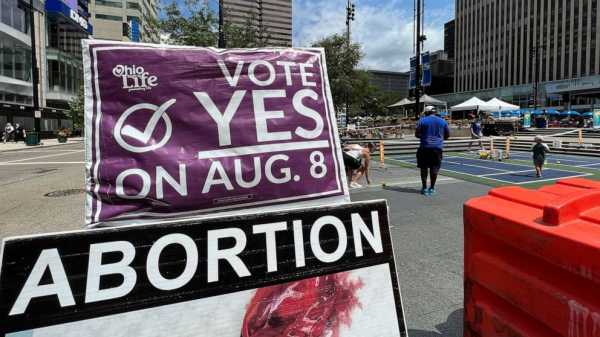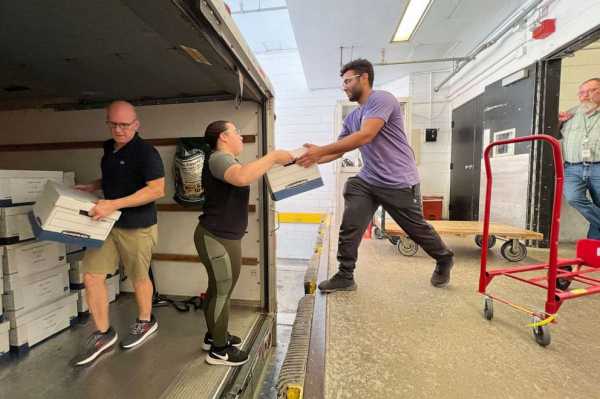Ohioans next week will vote in a special election to determine whether to raise the threshold required to amend the state constitution — and then, three months after that, voters will either approve or reject a ballot measure to enshrine abortion access in the state constitution.
A "yes" vote in Ohio's Aug. 8 election on State Issue 1 would mean future changes to the constitution require 60% support, up from the current minimum of 50% plus one.
If passed, the measure would go into effect before the November general election vote on the abortion measure.
The proposed abortion amendment would establish a "fundamental right to reproductive freedom" in the Ohio constitution. It names five categories in that scope: contraception, fertility treatment, continuing one's own pregnancy, miscarriage care and abortion.
State officials said last week that the requirements had been met to get the abortion measure on the ballot, pending any legal decisions.
MORE: Ohio abortion access amendment will appear on November ballot, state says
Critics have claimed the Aug. 8 election is a rushed, last-ditch effort by Republicans to change the rules in order to make it harder for the abortion ballot measure to succeed.
While next week's special election is not a direct vote on abortion, observers say the results could reflect how much the issue — which exit polls showed was top of mind for some voters during the 2022 midterm cycle — may continue to mobilize voters.
"Ohio is ground zero for the fight for abortion rights nationwide. While corrupt politicians are pulling out all the stops to prevent Ohio voters from having their voice heard on reproductive rights, we're organizing in communities across the state to help tell these out-of-touch GOP politicians: we won't go back," Ohio Democratic Party spokesman Matt Keyes told ABC News.
Defending State Issue 1, Republicans have said it's about protecting the state constitution from changes backed by special interest groups.

A sign asking Ohioans to vote in support of Issue 1 sits above another sign advocating against abortion rights at an event hosted by Created Equal, July 20, 2023, in Cincinnati.Patrick Orsagos/AP
However, one of the state's highest-ranking GOP officials has reportedly conceded that the focus of their efforts is on abortion.
"This is 100% about keeping a radical pro-abortion amendment out of our constitution. The left wants to jam it in there this coming November," Secretary of State Frank LaRose said at an event in May, according to local TV station WCMH.
That diverges from LaRose's other comments on the measure, when he said it is about protecting the constitution at large. LaRose has since echoed that initial position.
MORE: Harris raises alarm about abortion restrictions but has 'faith in the people of America'
"This is all about protecting our state Constitution from out of state special interest that really wanna try to buy their way into our states founding document," LaRose said while campaigning on State Issue 1 over the weekend.
Since the Supreme Court struck down its previous Roe v. Wade ruling, in 2022, and retuned the question of abortion access to individual states, various parts of the country have either tightened abortion restrictions and bans — or seen their voters approve ballot measures to expand abortion rights.
All of the pro-abortion access measures voted on directly by voters have been approved, though none made it past a 60% threshold.

Frank LaRose, Ohio Secretary of State, speaks on the third day of the CPAC (Conservative Political Action Conference) at Gaylord National Harbor Resort & Convention, March 3, 2023, in Washington.Lev Radin/Pacific Press/LightRocket via Getty Images
In an exclusive sit-down with ABC News Live Prime anchor Linsey Davis, Vice President Kamala Harris said recently that she is hopeful that as the abortion issue is brought directly to voters, they will cast ballots against the restrictions and leaders who support them.
"I am concerned about what's been happening, but I also have faith in the people of America," Harris said.
State Issue 1 was first introduced last year by a Republican state legislator and LaRose, the secretary of state, though it didn't clear the state House in order to make it on the May ballot. The measure was then reintroduced this year with some changes, like a requirement that future ballot petitioners, in order to proceed, would need to get voter signatures from all 88 counties instead of from 44 counties — something that critics also argue is too restrictive.
In May, Republican lawmakers approved a statewide vote on the measure for the August contest, despite the fact that a voting law passed last year eliminated most local August special elections.
"It looks awfully much like it was intended to close the door and lock it," Betty Montgomery, a former Republican Ohio attorney general, said during a recent City Club of Cleveland forum.
Early voting numbers for next week have been high thus far, according to Ohio secretary of state estimates.

Boxes of signatures are delivered to Republican Ohio Secretary of State Frank LaRose’s office in downtown Columbus, Ohio on July 5, 2023.Patrick Orsagos/AP
Ohio's 88 county boards of elections have sent nearly 250,000 absentee ballots to voters statewide since early voting began on July 11, the office said on Friday, noting that "reflect[s] a dramatic increase in voter activity over the August statewide primary election of 2022."
Because of the election's stakes for abortion access in Ohio, millions of dollars have flooded into the race, according to reports filed with the secretary of state's office on Thursday. Protect Our Constitution, the campaign supporting State Issue 1, has raised around $5 million. One Person One Vote, the opposition, has raised more than $14 million.
On both sides, the vast majority of funding comes from out-of-state donors.
Protect Women Ohio, the campaign opposing the abortion access ballot measure, and an affiliate have raised an additional $15 million, though it is not clear how much of those funds will be used for the August election versus November.
Abortion is currently legal in Ohio most of the way through the second trimester of a pregnancy.
The state passed a strict, so-called "heartbeat bill" last year, banning abortions as early as six weeks into a pregnancy, but that is on hold pending a legal challenge.
Sourse: abcnews.go.com






